Zen | Interview | “Long beautiful hair”
Here in the Netherlands, the number one-hit ‘Hair’ (1968) by a band called Zen, is a very well-known song. It was in the top 40 for a stunning 18 weeks and pretty much every Dutch citizen of a certain age knows it. Far fewer people know the story of Zen.
I was actually surprised when I found out that this song was from a Dutch band. I was even more surprised when I found out that they released other great songs that deserve to be way better known in my opinion. I reached out to members of the band and got in touch with Dirk van der Ploeg and Duco de Rijk, to unveil their story.
Here is the phone interview with Dirk van der Ploeg, the band’s guitar player, singer and main songwriter.
First of all, how are you doing?
Dirk van der Ploeg: Well, I’m doing pretty good, I cannot complain. I live in France, to my pleasure. The bad thing is that my wife passed away three years ago, that still hurts a lot. I’m alone now here but I have two daughters living in The Netherlands. This Thursday I’m going to The Netherlands and I’ll stay there for a week.
What is your earliest recollection of music?
My father was of protestant descent and he had an organ that he played regularly. He played a lot of songs from Johan de Heer, a religious songbook.
Did your father teach you how to play music?
Yes, at a certain point I had organ lessons. Although I hated it, to be honest, it did teach me the basic principles of music.
And after that you picked up the guitar?
Yes, my brother had a guitar. I tried to mess around on his guitar and he also had a booklet that had all kinds of guitar chords in it, so that’s how I taught myself to play guitar.
Can you tell me how your band Zen started?
Yes, together with Siegfried de Jong, who I knew from school, I formed a band. Harry played clarinet and Siegfried played saxophone. At first we played jazz, we also participated in the Loosdrecht Jazz Concours, together with a bass player. We also had a Dixieland band and participated again in a competition, where we won the second prize! In the category Dixieland we even won the first prize, but we were the only ones participating (laughing)! So we had both the first and the last prize. I can’t remember the name of our band. We had a full line-up, we had trombone, trumpet, clarinet, I was playing banjo and there was also a drummer, playing with brushes.
Siegfried and I started living together in a basement and that’s where we got the idea to start playing a different kind of music. I absolutely loved the music of The Beatles and with other friends I was already playing songs by The Everly Brothers and things like that. So at a certain point we decided to form a band. I was a truck driver at that time, and there was another truck driver, Cees Visser, who happened to be a good singer and guitar player. On his turn, he knew somebody that could play the bass, Bart Bos. The trombone player from our Dixieland band, Valentijn Geverts, was also specialized in percussion, so he became our drummer and the band was complete.
The first name that we came up with was The Dying Flutchmen as a variation of “The Flying Dutchmen”! Then Siegfried came up with the name Zen. It was a time of different religious directions and stuff like that. I had read something about zen and thought it would be a very nice band name, nice and short.
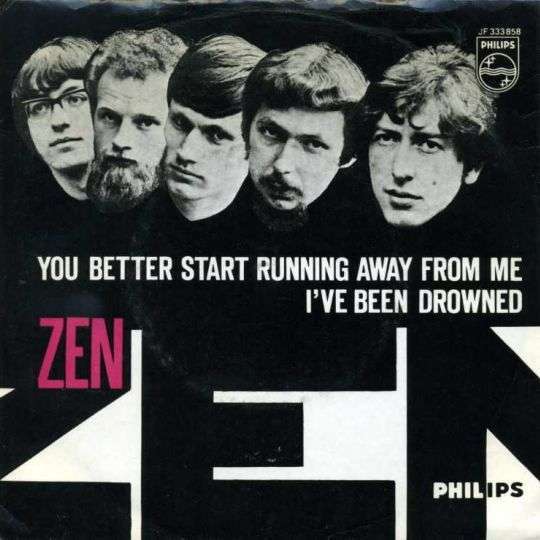
How did the collaboration with (renowned Dutch music producer) Hans van Hemert and the recording of your first single come about?
We had a friend, Ton van Dijk, he was working as a journalist for De Tijd (Dutch newspaper), so because of that he had quite a network. At a certain point, he went to Phonogram Records, to Hans van Hemert and asked if he could come and listen to our band. Hans van Hemert came to see us and he saw something in us, so then we began recording. In that time we played popular songs and I also wrote my own songs, I already did that when we had the jazz band. I thought, if you want to reach something, you should write your own songs instead of only playing covers.
Did you already have an extensive repertoire of your own songs in that era?
At that point, I had written about 20 songs.
Did you have the feeling that there was a competition going on between the music scenes of Amsterdam and The Hague at that time?
Being from Amsterdam, we couldn’t compete with the music scene in The Hague. Amsterdam as a city was of course a bit more alive and modern, but the music was mainly from The Hague, we couldn’t possibly compete with that. In The Hague, they had a whole scene of playing in clubs et cetera, over there it was already way more established than it was here.
Were there any bands you considered as competitors?
No, I’ve never felt like that. I didn’t have the feeling that I had to move mountains to reach the top. We just had to make good music, but that came more from ourselves than from a feeling of competition. Once we played in a hotel in Volendam, some band members of The Cats were in the room, watching our show. They said to us: “We will become way more famous than you will!” They already had a good network at that time and of course they did become more famous than Zen in the end.
Your manager Ton van Dijk said in an interview in 1969 that you had already written as much as 200 songs. How did you get inspiration for writing all those songs?
Well I think 200 songs is a bit exaggerated to be honest, but that fits Ton, he always knew how to sell a story. I got a big part of my inspiration from the music that was already being made. I was playing around all the time with transitions in music and chord progressions, that was a source of inspiration. I was also inspired by bands that had polyphonic vocals, for example The Hollies and The Four Seasons. The Beach Boys? Yes, definitely, all the way! I also loved The Byrds.

How did you translate your ideas to the rest of the band?
We had our rehearsal nights of course. Over there we played covers and tried to give our own twist to it and we also played our own songs. In the beginning, I was the only one writing songs. Later on, Duco de Rijk also wrote songs. In the rehearsal room, we worked out our ideas.
So was it a natural process of every member coming up with their own parts?
Yes, I didn’t really have ideas on how the drums and bass parts should be like for example, but I did have my ideas on the polyphonic vocals.
Are there still a lot of unreleased songs from you that stayed on the shelf, and if so, are there any plans to release them?
Yes, definitely, I began writing more and more songs as time went on. At a certain point, Harry Rijnbergen and Bennie Groen from Ro-d-Ys joined our band. Harry also wrote songs so we had two songwriters at that time, and my songs happened to become less appreciated by the rest of the band.
When all sorts of musicals started to appear and became popular, I got the idea of making a musical with my own songs. We could pick a selection of my songs and write a story around them. That never happened. I’ve got a box with a lot of old recording tapes downstairs. Some of those songs ended up on my solo record.
Speaking about your 1973 solo record, the music on there seems to be more in the country genre. It features an impressive all-star line-up of renowned musicians, can you tell me how this album came about?
At that time, I was really into the music of The Eagles and I was also a big fan of The Byrds. ‘Sweetheart Of The Rodeo’ was a very good album in my opinion. I was also crazy about The Flying Burrito Brothers, I thought it was just great, that music sent shivers down my spine.
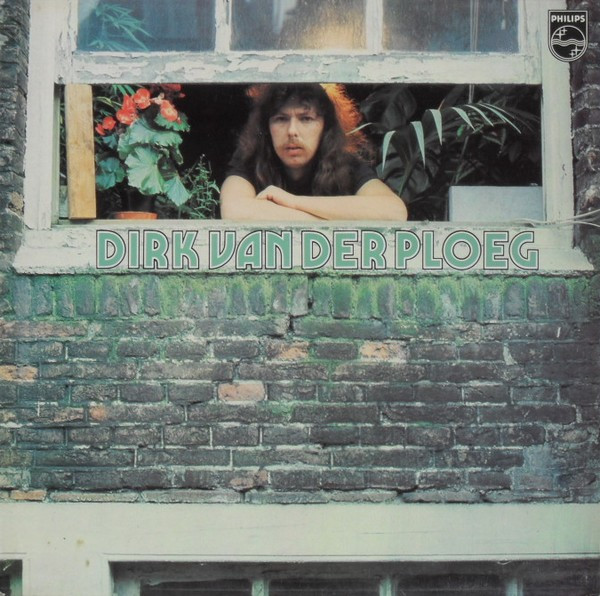
Ton van Dijk had me signed up at Phonogram Records. When I left Zen, I wrote a number of country-like songs and recorded them on my Revox. I reached out to Boudewijn de Groot (one of the most successful Dutch artists and also a producer) and he listened to my songs. He was confident about it so we recorded the songs in the studio. In the studio we looked for musicians that could join us. Louis Debij played drums and Koos Serierse played bass. For each song, a guest musician was added. One of them was (Golden Earring’s guitarist) George Kooymans, he played a magnificent guitar solo on one track. I went to his house to go through everything. The sisters Patricia and Yvonne Paay also joined us. Unfortunately, I didn’t get to see them, they recorded beautiful vocals when I was not in the studio. Rick van der Linden (Ekseption’s organ player) also played an organ solo on the album.
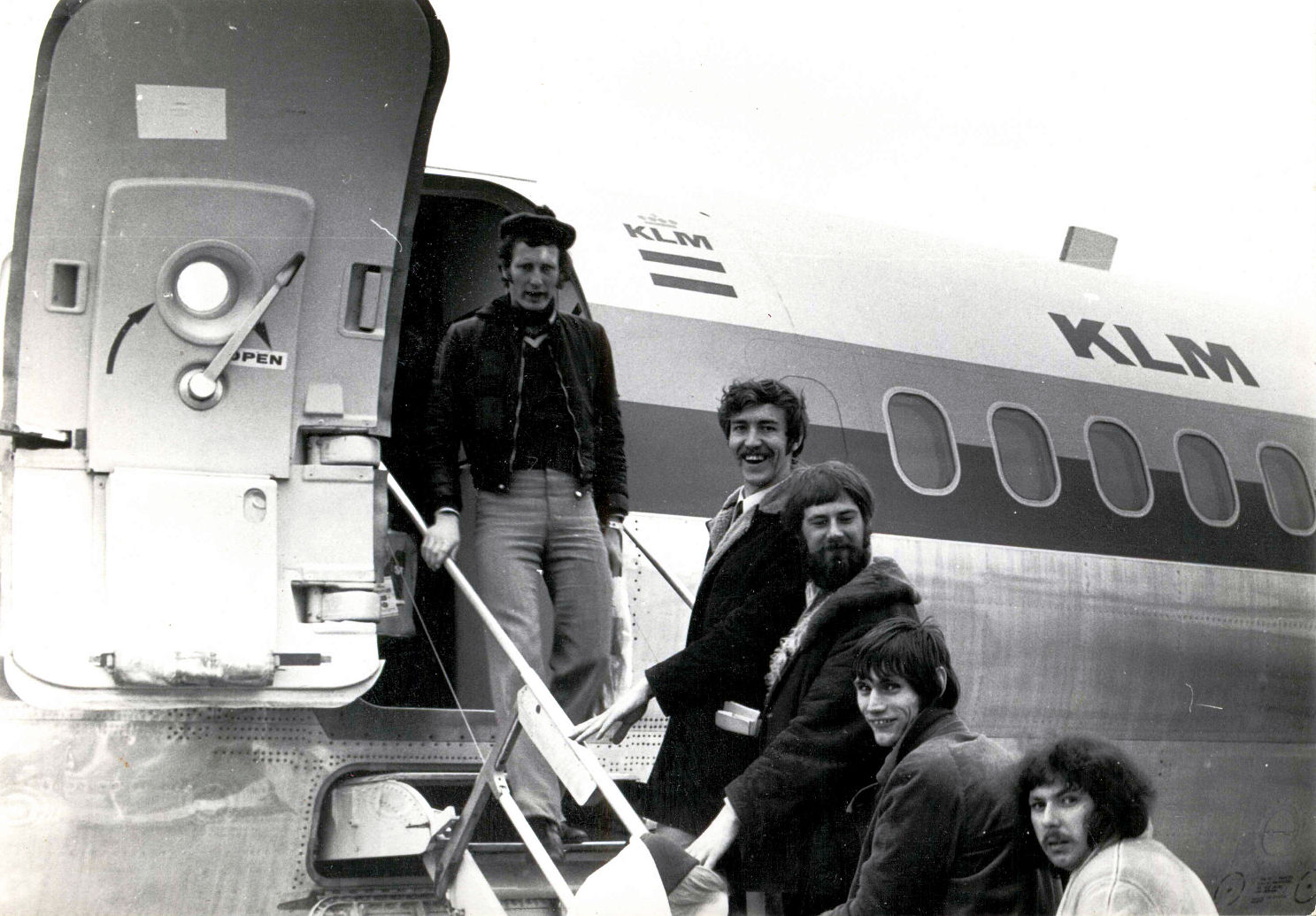
How did Harry Rijnbergen and Bennie Groen from the band Ro-d-Ys (they came from a different part of the country) end up in Zen, and how did you experience the collaboration with them?
The first line-up of the band was with Cees Visser and Valentijn Geverts, then Duco de Rijk, solo-guitarist joined us. Drummer Valentijn Geverts got replaced by Wim van Taarling and lead singer John Brands joined us. Manager Ton van Dijk worked at Altona, John Brands also worked there so that’s how he came in. In that line-up we recorded (the number one hit single) ‘Hair’. There had to be a follow-up of ‘Hair’. John Brands and Duco de Rijk didn’t get along so well. Wim van Taarling was frequently ill and had to be replaced by other drummers all the time. In that time the band nearly split up. Then our producer Hans van Hemert, came up with the idea to merge Zen with Ro-d-Ys, another band that Hans worked with and also happened to be splitting up at that time. So Ro-d-Ys’ lead singer and guitar player Harry Rijnbergen and drummer Bennie Groen joined us. That was the last incarnation of the band that had me in it. Later on, Siegfried de Jong carried on with other musicians.
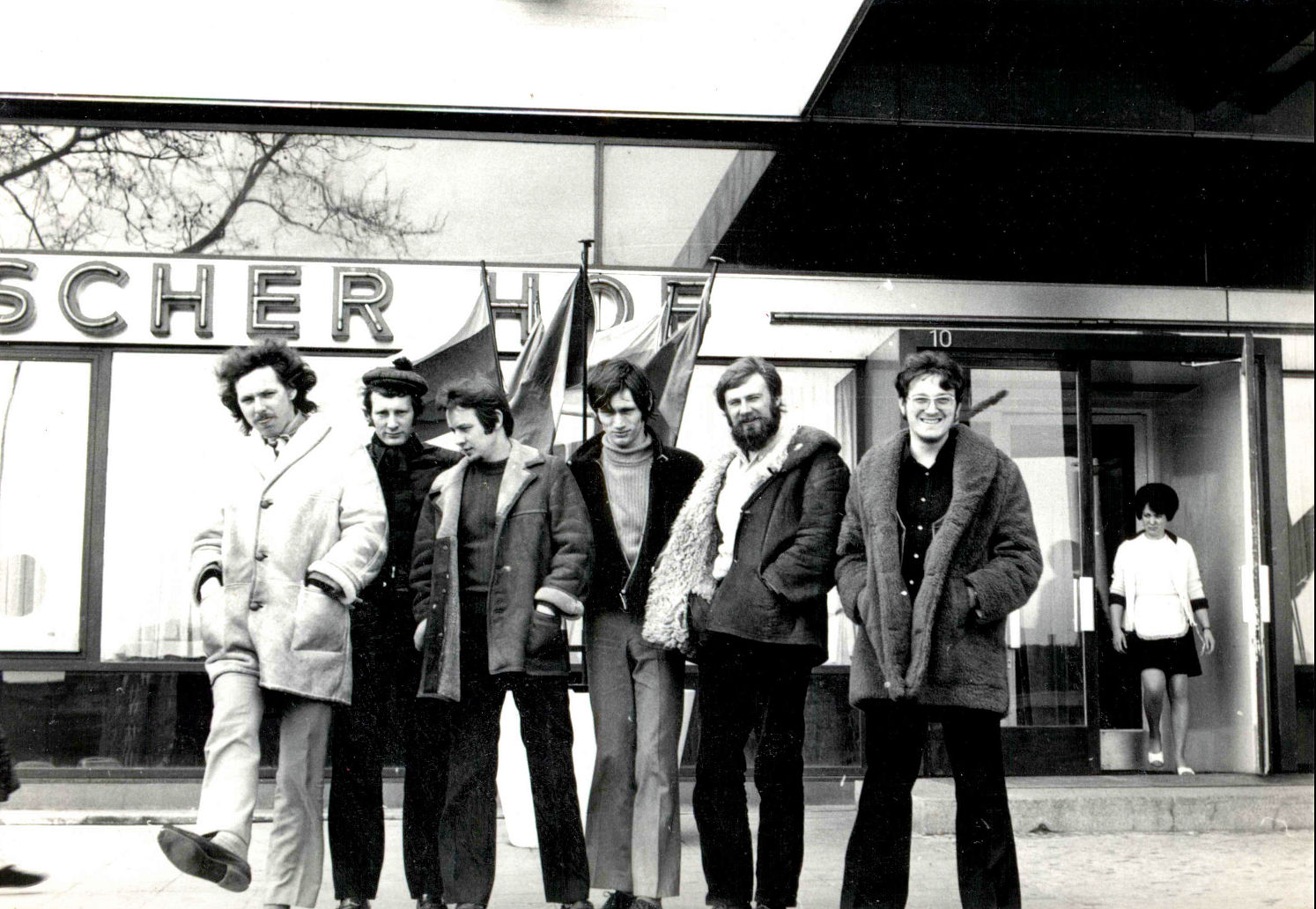
When and why did you decide to quit Zen?
As a performing group, we were playing a lot better with that last line-up than at the time with John Brands and Duco de Rijk. I really wanted to make a good show. During gigs, we had to discuss what song we were going to play after each song. I didn’t like that, I wanted us to make a setlist and play the songs continuously, maybe room for some words every now and then, but it had to become a good show. The rest of the band didn’t feel like doing that. Apart from that, I thought we had to rehearse the songs better as well. At a certain point I came up with points of attention, and made clear how I thought things should be done, if not, I would quit the band. We tried that for some time but it didn’t really work out well. We were into hash at that time, so the rehearsals were not as productive as they should have been. Then I decided to quit. We finished the shows that we still had to do and after that, the band split up.
Harry and Bennie were living on a farmyard in Zuid-Scharwoude, our rehearsal room was also on that farmyard. We had parties over there and had great fun but sometimes there was a bit too much fun going on.
So there was more partying than rehearsing?
Yes, I think so. In that time I was stoned continuously for half a year. When I look back at it now I think, holy smokes! What a time that was! It was pretty nice.
Have you done anything in music after the release of your solo-album in 1973?
No, I thought I had tried it and did my best, we also had a television appearance to promote the solo-album, after that I felt like I was done. Back then I was hanging around in the pub a lot. At some point I got promoted, at first I was on one side of the bar, then I ended up on the other side of the bar, I became the bartender. It was a story like The Stonecutter. People in the pub always used to think that I was a working student, then I thought to myself, why not become a student? I met my wife in that pub and started studying psychology. After that I have worked as a methodologist at the university of Utrecht and the university of Leiden. In 2008 I moved to France.
Are you still in touch with your old band mates from Zen?
No, unfortunately not. I used to have contact with Ton van Dijk every now and then but he passed away last year, that’s kind of where it has ended. It’s sad on one hand, but on the other hand, history has to be made as well. Around 1998 Duco de Rijk played with a band called The Paramounts, also featuring Zen’s drummer Wim van Taarling. I also joined them, but I already started to lose my hearing so I was not so good anymore, then I had to stop. All the sounds don’t sound as I would like them to. At a certain point I couldn’t even recognize the songs anymore. Music became terrible to listen to. It sucked, I had a hard time dealing with that. The music became really shrill and sharp, it was very annoying.
Do you have any plans for the future?
I converted a van into a camper, so I like to travel somewhere every now and then. Cooking is also a new hobby for me, that’s also one of the reasons why I’m living in France now. We also had some sort of living room restaurant here. Friends come over to eat here sometimes, tonight we had confit de canard with white beans, it was delicious!
Thank you! I enjoyed being interviewed, It’s not something that happens every day. It was nice to hear that you appreciate our songs and that you have done research on it.
It was a pleasure, of course I know Zen’s hit song ‘Hair’ from the radio, but I was pleasantly surprised when I found out that you have a lot of other great songs that nobody seems to know surprisingly.
Every year I receive a payment bill from the royalties. One of the most remarkable things on there is that our third single, ‘Please Accept My Invitation’, seems to be pretty popular nowadays in some sort of strange country. I won’t get rich from the royalties but I can buy a nice bottle of wine from it. I made a mistake with ‘Hair’. Our arrangement of the song is significantly different from the original version. As I made the arrangement, I could have been entitled to one third part of the income from the single.
Who’s idea was it to make a rendition of the song ‘Hair’?
It was my idea. After our third single failed, it was time to do something different. Ton van Dijk came to us with songs from the musical ‘Hair’. I saw possibilities to do something with the title song. I changed the tempo, it all got a little tighter. I also added the vocal choirs. We recorded it under the influence of speed, by the way. We were kind of running into a dead end at Phonogram Records, Hans van Hemert also wasn’t really feeling like doing it. After all, Ton van Dijk still managed to persuade him to do the recording. We did the recording with Jan Audier in Blaricum. The only possibility to do a recording session was at 8 in the morning. We consumed the speed over there, you could lose weight with it, you could do all sorts of things with it and you really had a good time with that stuff. I took some of it and some others took it as well. We were in high spirits and the recording session went very well!
After the interview with Dirk van der Ploeg, I visited Zen’s lead guitar player, Duco de Rijk at his company, D&R Electronica in Weesp. Here is the interview:
How did you end up in Zen?
Duco de Rijk: I started my own band, The Paramounts, at age 16. I had to leave the band for one and a half years because of military service, I couldn’t combine those things. When the military service was done, I wanted to do something with music again. I can’t remember exactly how I got in touch with Zen, I think I auditioned for them because they were looking for a new guitarist. I got in the band but I didn’t like the playing of their drummer, Valentijn Geverts. He wasn’t really a bad drummer but his style was a bit “frumpy”. I knew a good drummer, Wim van Taarling from The Paramounts, so I introduced him to Zen and he became the drummer. We had to record ‘Hair’ and our producer Hans van Hemert was unsatisfied about our singing, then John Brands recorded the vocals for ‘Hair’, and stayed in the band after that.
In a way, there were two groups in the band at that time. One group consisted of the modern pop musicians, that included Wim van Taarling, John Brands and myself. The other group consisted of the original members Dirk van der Ploeg, Bart Bos and Siebe de Jong, they used to make some sort of melodic, mysterious, hazy music.
Did you, as a band, manage to get those groups together?
We tried that for a while, but when the big success of ‘Hair’ came to an end, the new experiences and all of that disappeared, it just ended. A part of the group continued and merged with Ro-d-Ys from Groningen, they released some singles as well.
You didn’t want to participate in that?
No, Wim van Taarling and I went on to play with The Paramounts again.
I’ve read that The Paramounts also opened up for The Rolling Stones at the legendary Kurhaus concert in 1964, were you playing with them that evening?
Yes, that was quite a mess!
Did you manage to get out unscathed?
Yes, before that, there was nothing. The organisation created a frumpy program of support acts that included (famous Dutch comedian) André van Duin, The Ricochets and The Paramounts. People didn’t come for that, they came to see The Stones. The audience didn’t want to see these proper and decent Dutch bands or André van Duin jumping around like a rabbit. Because all of that, there was already a tense atmosphere before The Stones even played. Then The Stones came on stage and things got crazy. I believe Mick Jagger sang three lines before the cable of his microphone got pulled out. Then the police came inside with horses! By then, much of the Kurhaus was already ruined. It was a bizarre evening.
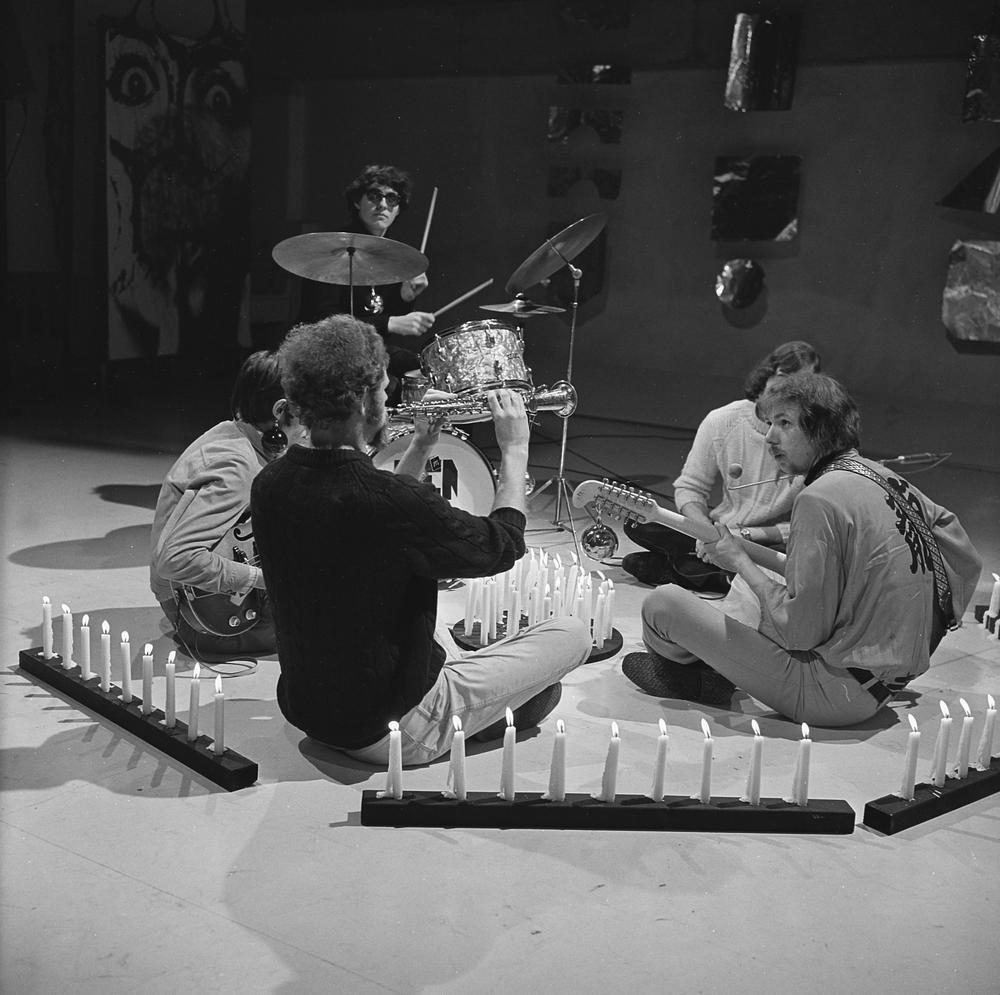
Where does your interest for all of this come from and what are you going to do with this information?
I’m going to write an article that includes this interview, the interview with Dirk van der Ploeg and hopefully some nice photos. It will be published by an online music magazine called It’s Psychedelic Baby! Magazine.
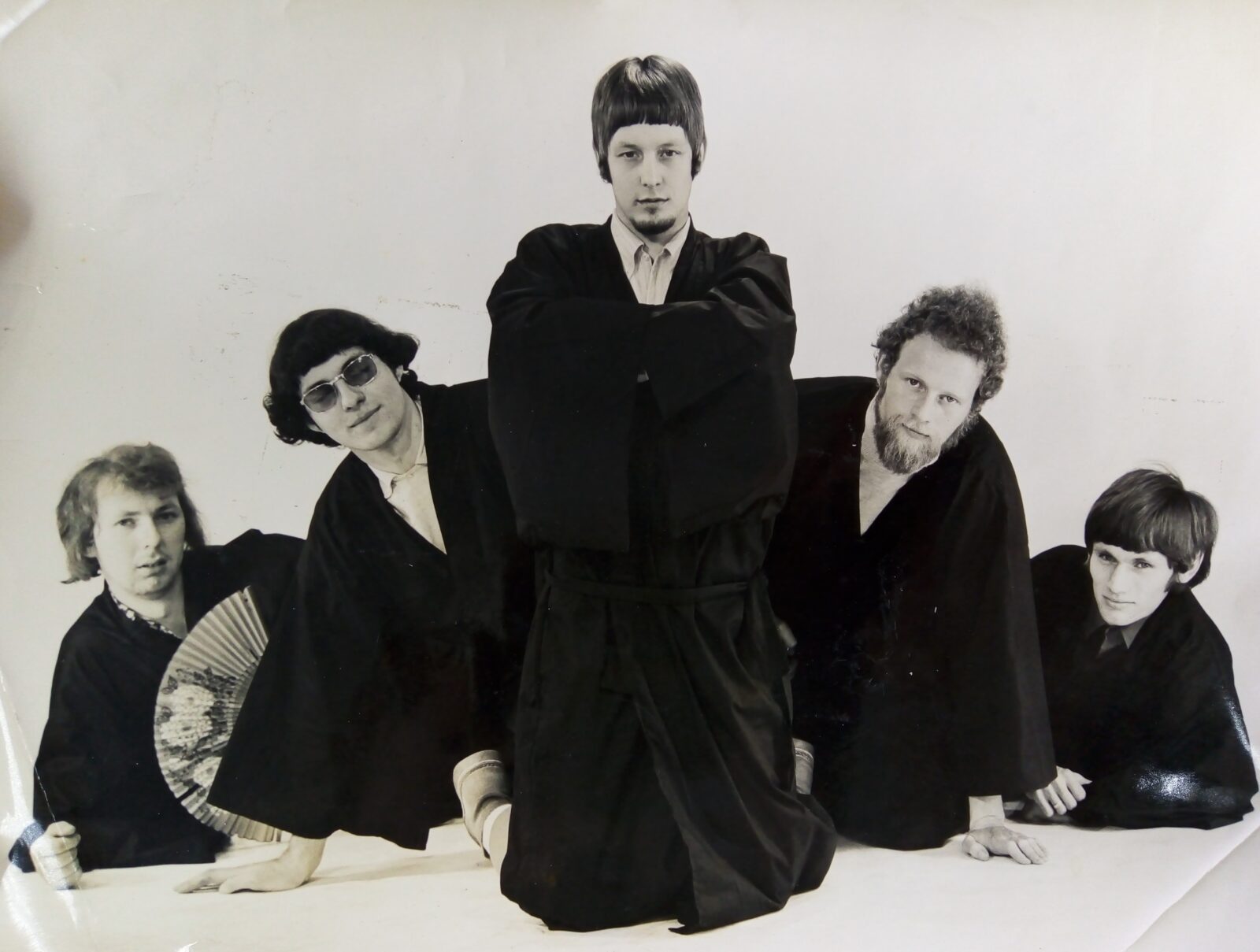
Oh yeah Zen’s music sure is psychedelic, except for our big hit ‘Hair’, that was pop.
The perfect pop song.
Yeah I think it has been in the Top 2000 for like 20 years, only the last couple of years it’s not in there anymore.
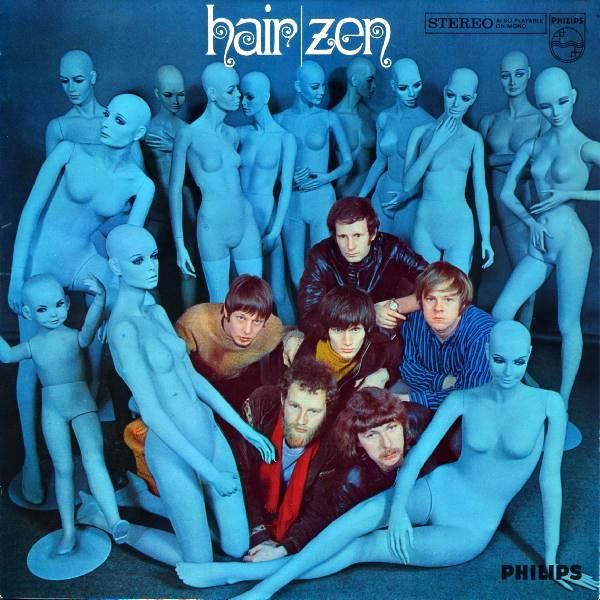
Yes I also remember hearing it quite frequently on the radio until about 10 years ago, but I don’t hear it so much anymore these days, unfortunately.
Yes, a song like that doesn’t have eternal life.
Your guitar playing and especially your fuzzy, deep cutting guitar sound is an important part of the song ‘Hair’, but is also clearly present on other Zen songs like ‘Take It.’ What gear did you use to get this sound?
A Fender Stratocaster, a homemade amplifier, a modified Geloso, an Italian brand that made cheap amps. I modified it using diagrams from Vox and Fender, a combination of the two. I made the fuzz-pedal myself. I donated it to Museum Rockart about 15 years ago, together with some more stuff like some sort of declaration of the fact that we sold 100.000 copies of ‘Hair’.
I see the gold record of ‘Hair’ standing there in the closet.
Yes, that’s a reproduction actually. The original copy went to our manager Ton van Dijk, he passed away so I don’t know where it is right now. Back in the days, only one gold record used to be presented to the band. We once had a reunion, so I took a number of singles and spray painted them gold, I gave them to all the band members, as a sort of joke.
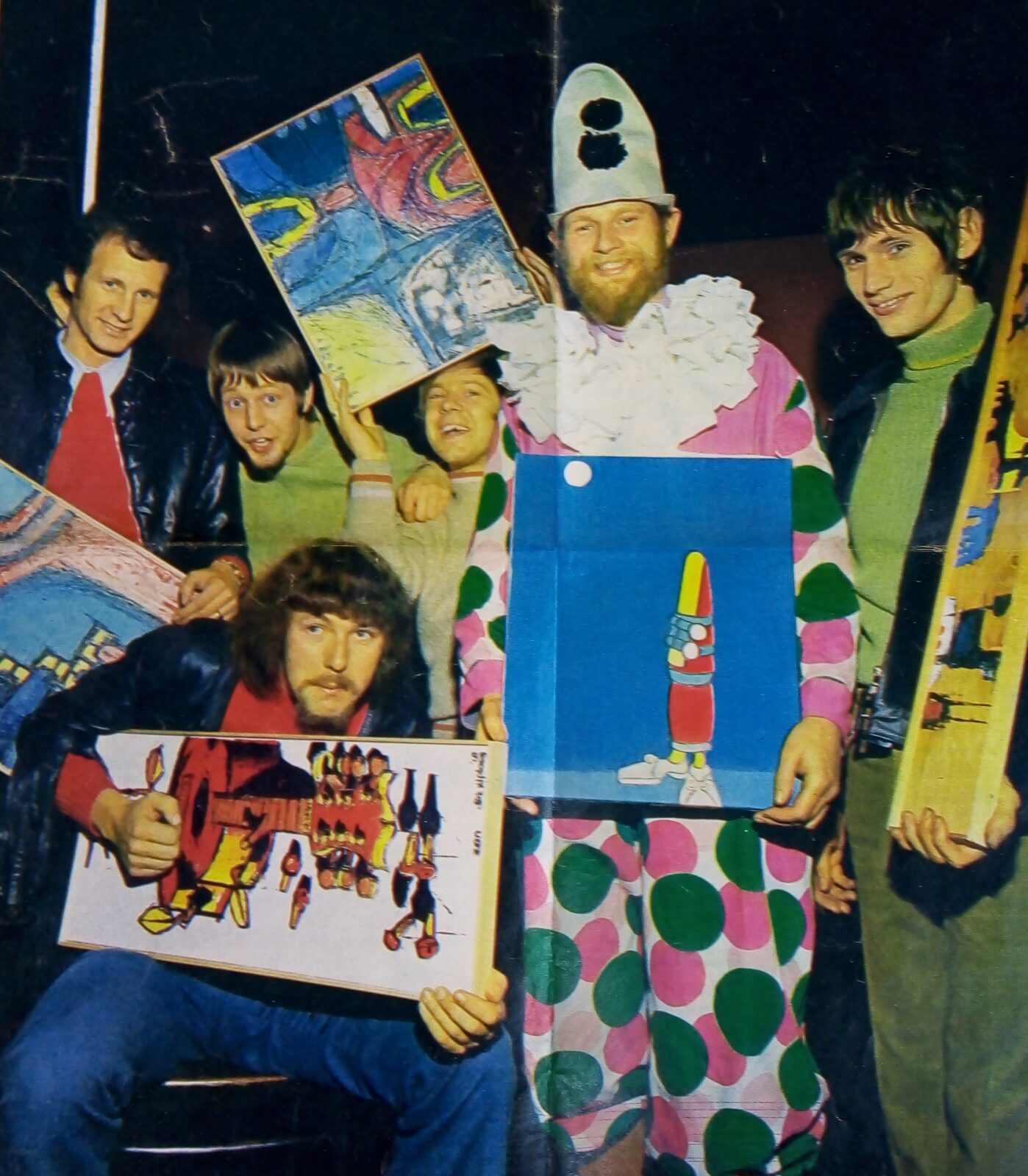
That’s a nice story, when was that reunion?
I was about 45 years old then, that is a long time ago. I think it’s 33 years ago. We played here in the canteen of my company, we played ‘Hair’ one more time.
With all of the original members?
Yes, Dirk was there, the drummer was there, I was there and we had a different rhythm guitarist. John Brands also joined us, that was fun. He had promised to never sing again but we managed to tempt him. Although he didn’t remember the words, he could still sing very well, but that was some time ago, back when we were all in better shape than we are in now. I believe everybody from the band is still alive, except for our manager Ton van Dijk.
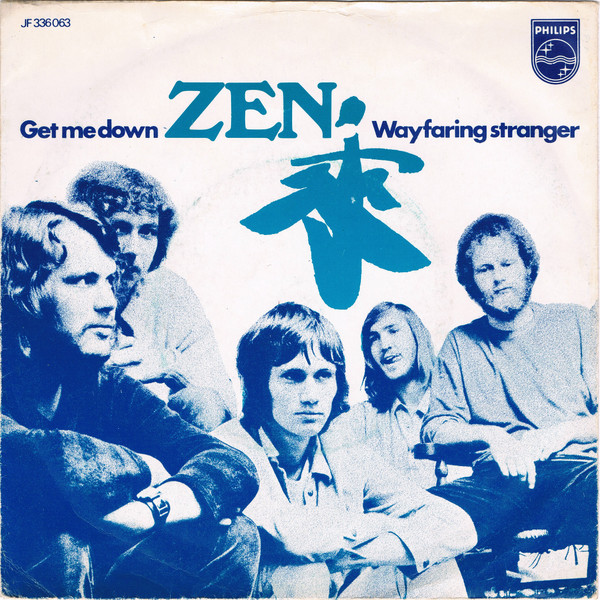
Do you think there is a possibility of another reunion?
No. The drummer has health issues that make it impossible for him to do it. Drumming is also physically intensive. When playing guitar, you only have to move your fingers. I play about once per month with some friends here in the studio. We play Shadows-music, just for fun.
What guitarists inspired you?
Well I started playing guitar because of The Shadows. They had quite simple melodies. Later on, I played in a cover band for many years and we played pretty much anything. We selected the music purely on the songs themselves, not because it was from a specific guitar player.
How did you experience the success with the hit single ‘Hair’?
It was very nice, I’m glad that it happened, those screaming girls and things like that. It was a great time. It all started with Rudi Carrell, he wanted to make an item about long hair in the Rudi Carrell Show and he invited us. Then we took the title song from the American musical ‘Hair’ and we made a new arrangement for it. We played it at the Rudi Carrell Show and that’s how it took off.
Was that your first gig with Zen?
No, I was already in the band then. The remarkable thing is that the original members made a completely different kind of music. Dirk used to make very nice melodic stuff. I made the arrangement together with Dirk, and it had nothing to do with the music that Zen used to make before that. It was something miraculous, that song. It had a totally different atmosphere compared to the earlier songs.
It’s also significantly different from the original version.
Yes that’s true, we left a complete piece out of it and things like that. It was meant to be a one-time event for the Rudi Carrell Show.
Is there still footage out there of that appearance?
No, nothing at all. We appeared on many tv-shows in The Netherlands and Belgium, but no footage at all can be found. There is one video of us in a shop for musical instruments, they used that as a sort of video clip for ‘Hair’ and it can be found on YouTube.
The big success of ‘Hair’ went on for about one year. We made a follow up to ‘Hair’, called ‘Bye Bye Heart’. The song was similar to ‘Hair’ in structure and in sound, but it failed to do anything at all.
When that failed, the band fell apart.
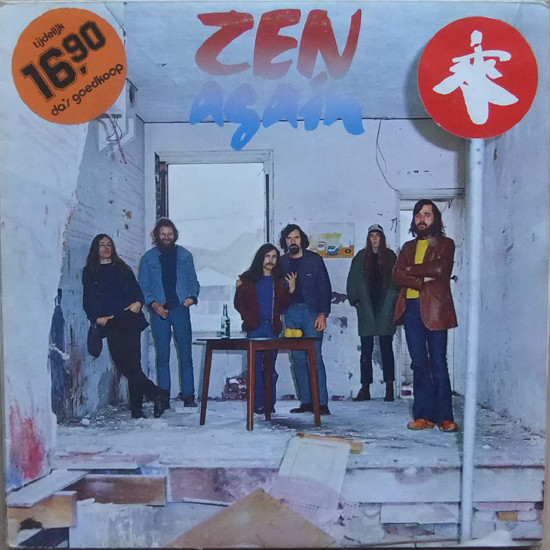
When the band broke up, a part of the band merged with Ro-d-Ys and went on to release music, I have seen that you ended up in a band called Gallery (their killer 1971 single ‘Emptiness Inside’/’The Problem’ can be found on YouTube), can you tell me about that?
Yes that was a band together with the R from D&R. My company is called D&R and that stands for Duco and Ron. Ron was the bass player and we had a drummer and a rhythm guitarist. John van Setten was our manager, he was also the manager for Brainbox so we used to share bills with Brainbox a lot of times.
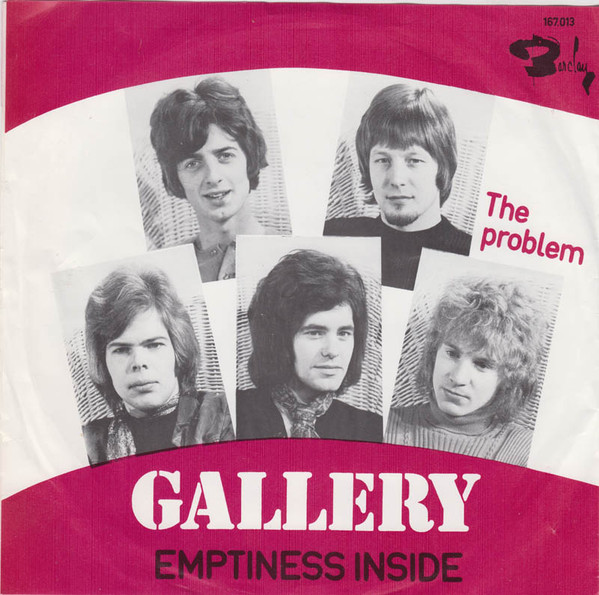
I have also been in a band called Graaf X Climax. The drummer of that band was Frans Smit, he was the husband of Maggie MacNeal from Mouth & MacNeal. He was a very good drummer and also played in Brainbox for a while.
I started playing with The Paramounts again, with another singer. We did a reunion with the original members and we liked it so much that we started playing again in the coverband-scene for about 15 years. It ended just 4 or 5 years ago when our drummer passed away.
I founded this company and we composed musicals for a while. One of the people I worked with, was a teacher at a school and he wrote musicals for the farewell-evening of the children that left school. We composed the songs for that and the children recorded it for a backing track and they were playing backing to their own voices when performing the musical.
Nowadays I only play once per month together with some friends here in the studio. We don’t perform, I’m done with that, carrying around all your stuff, you know. Leaving at 4 in the afternoon and coming home at 4 in the night is not that attractive anymore when you’re 77 years old.
Apart from performing, do you have any musical ambitions for the future?
No, totally not, I only play for relaxation and I record it to see if I can optimize it. Right here, I have all the gear that I can wish for, that’s the benefit of having your own company.
You just told me that you modified your own amplifier and made your own fuzz-pedal, so back then you already knew how to work with electronics, is that how you ended up founding this company?
Yes, I also made echo-machines with tape-recorders and things like that. I didn’t have any education for this, I’ve set a lot of stuff on fire to find out how it worked. In the beginning, I designed all analogue equipment here.
What is your company exactly doing?
At the moment, we produce mixing consoles for radio studio’s, but also for internet radio stations. Especially during the pandemic a lot of DJ’s went home and made their radio programs from home. We design and build those products here. About 80 percent of our products are exported, so that’s what keeps me busy everyday.
What have you experienced as the pinnacle of your musical career?
It was the hit single ‘Hair’, the tv-appearances, the sold out shows and things like that, that was very special. It was good for my ego back then (laughing)! It was a nice experience, being warmly welcomed everywhere, performing abroad, in Berlin and being picked up from the airport in a big fancy car. The drummer had fear of flying so he didn’t go with us, a roadie took place behind the drum kit in the tv-studio.
We used to do all sorts of fun things in that time. Our manager Ton van Dijk had all sorts of ideas for us and knew how to arouse publicity. One time, there was some sort of big box with slots in it placed on the Dam square in Amsterdam. The band members were inside the box and we were handing out flyers and stuff like that through the slots. The police had to come and the media covered the event, so we got what we wanted, Ton was a great manager.
Thank you for your time!
Barend Kemper
Headline photo: Zen Postcard. From left to right Bart Bos, Duco de Rijk, Siebe (Siegfried) de Jong. Wim van Taarling, John Brands, Dirk van der Ploeg.
Special thanks to: Dirk van der Ploeg, Duco de Rijk, Klemen Breznikar, Hans van Hemert and Bouke van Gelderen.

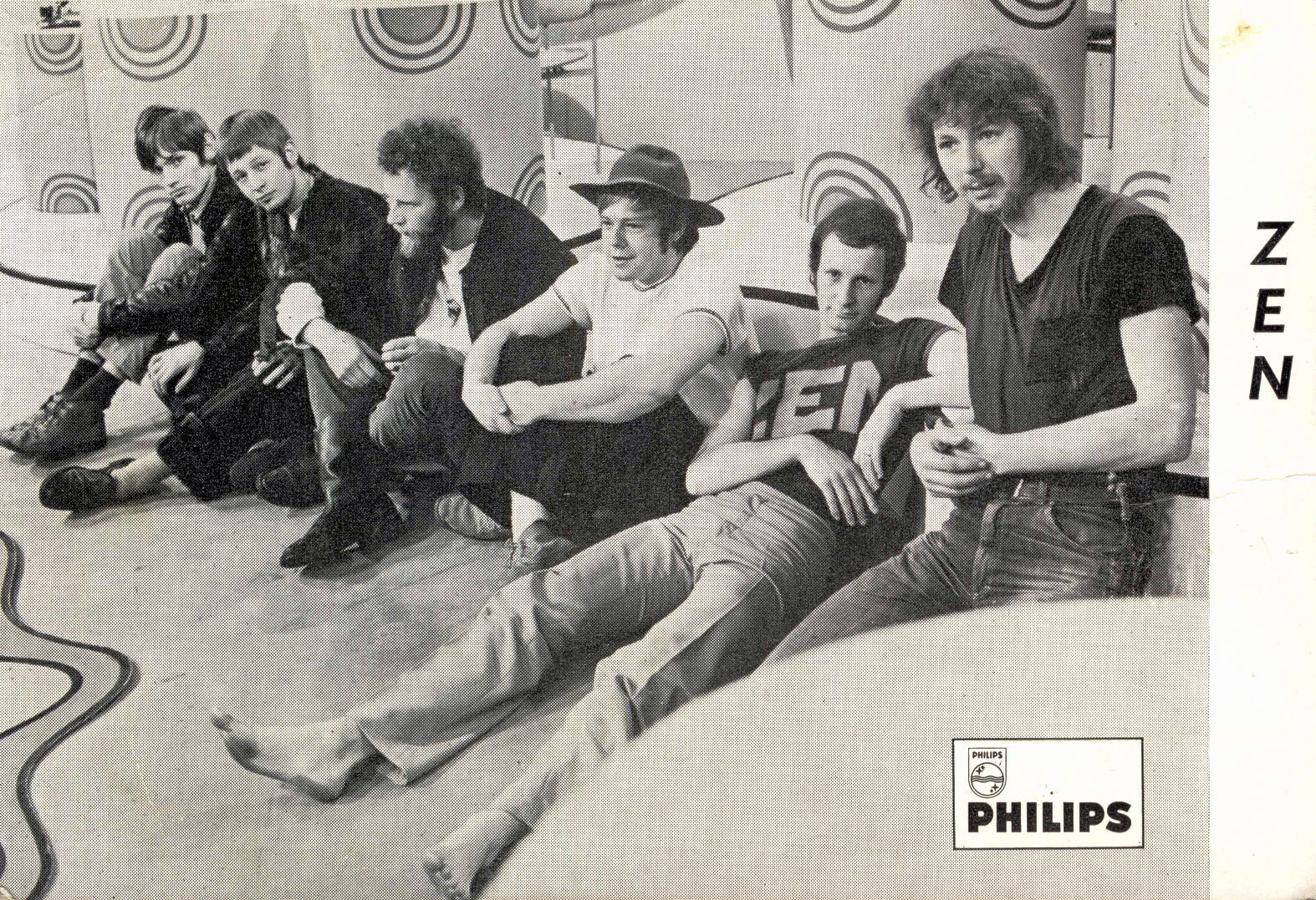
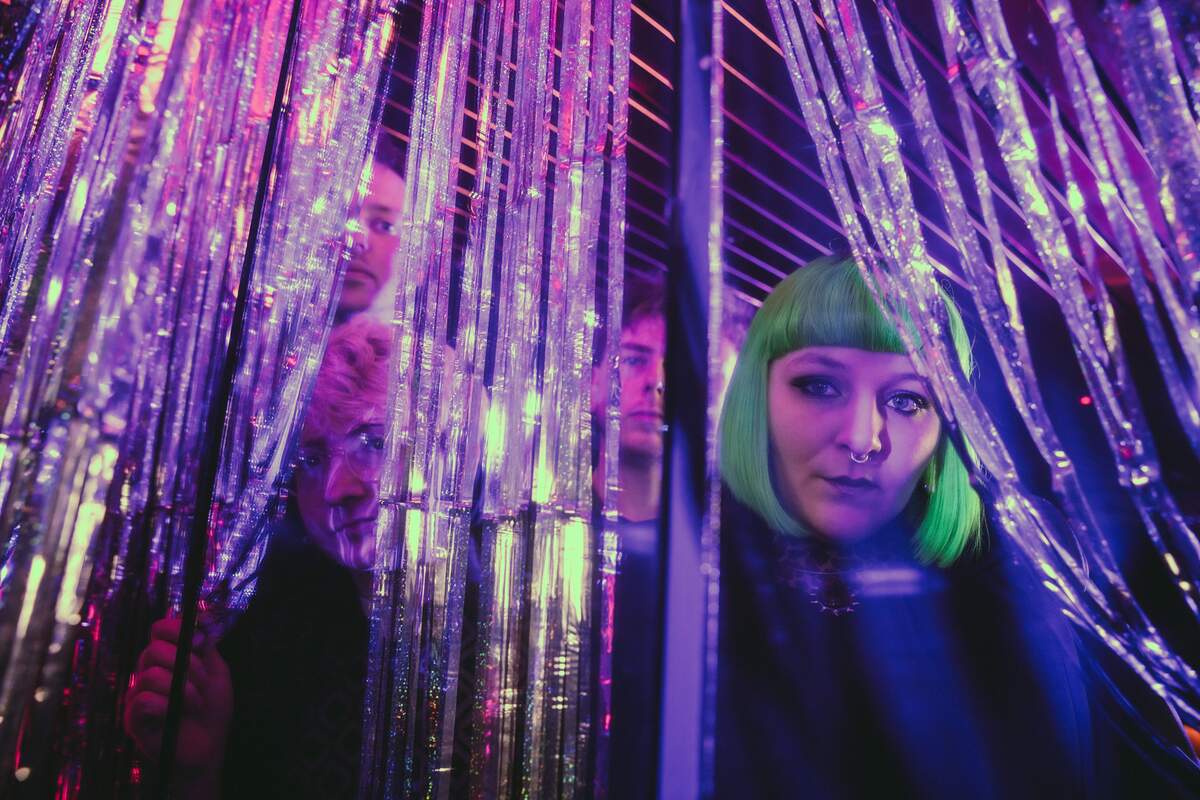
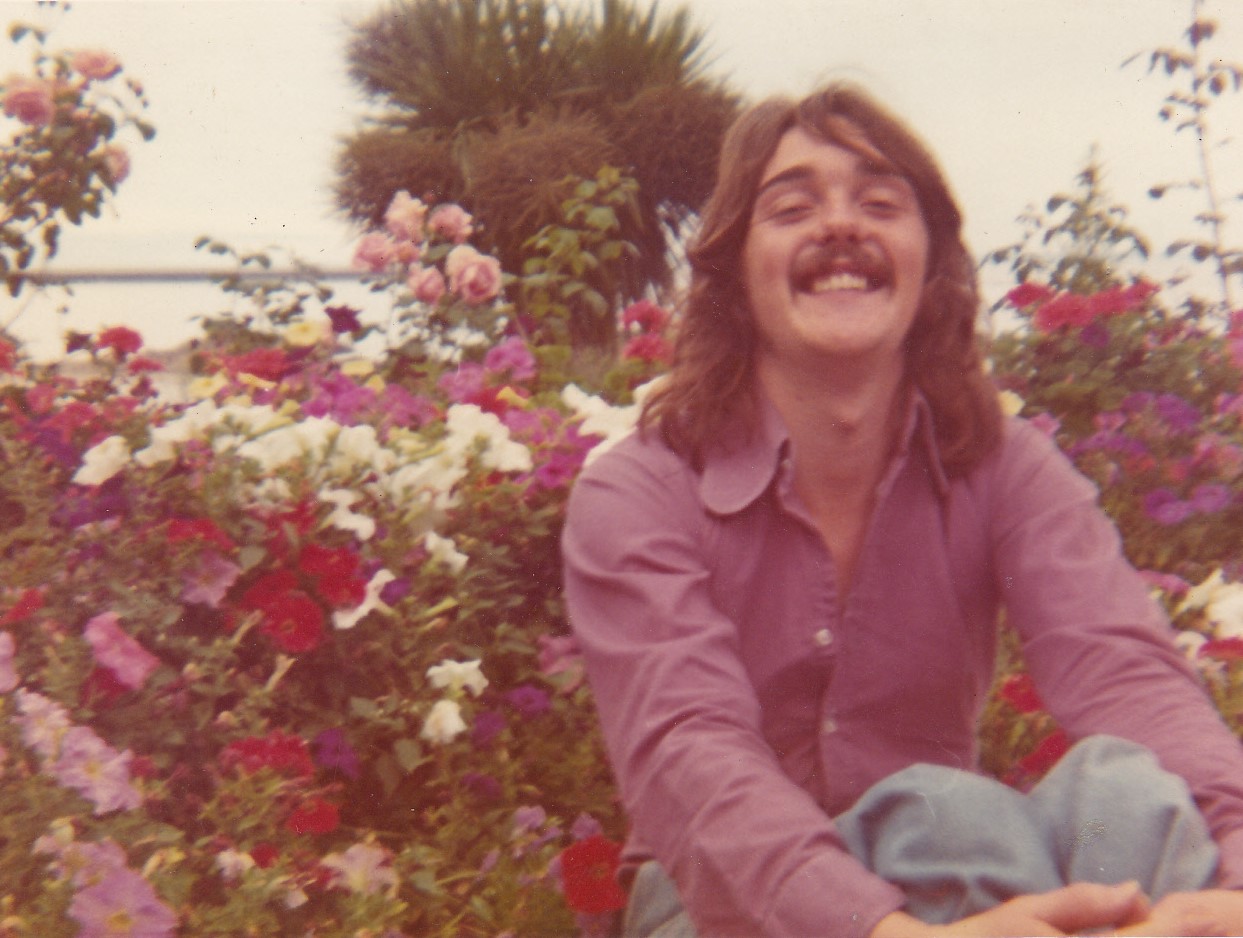
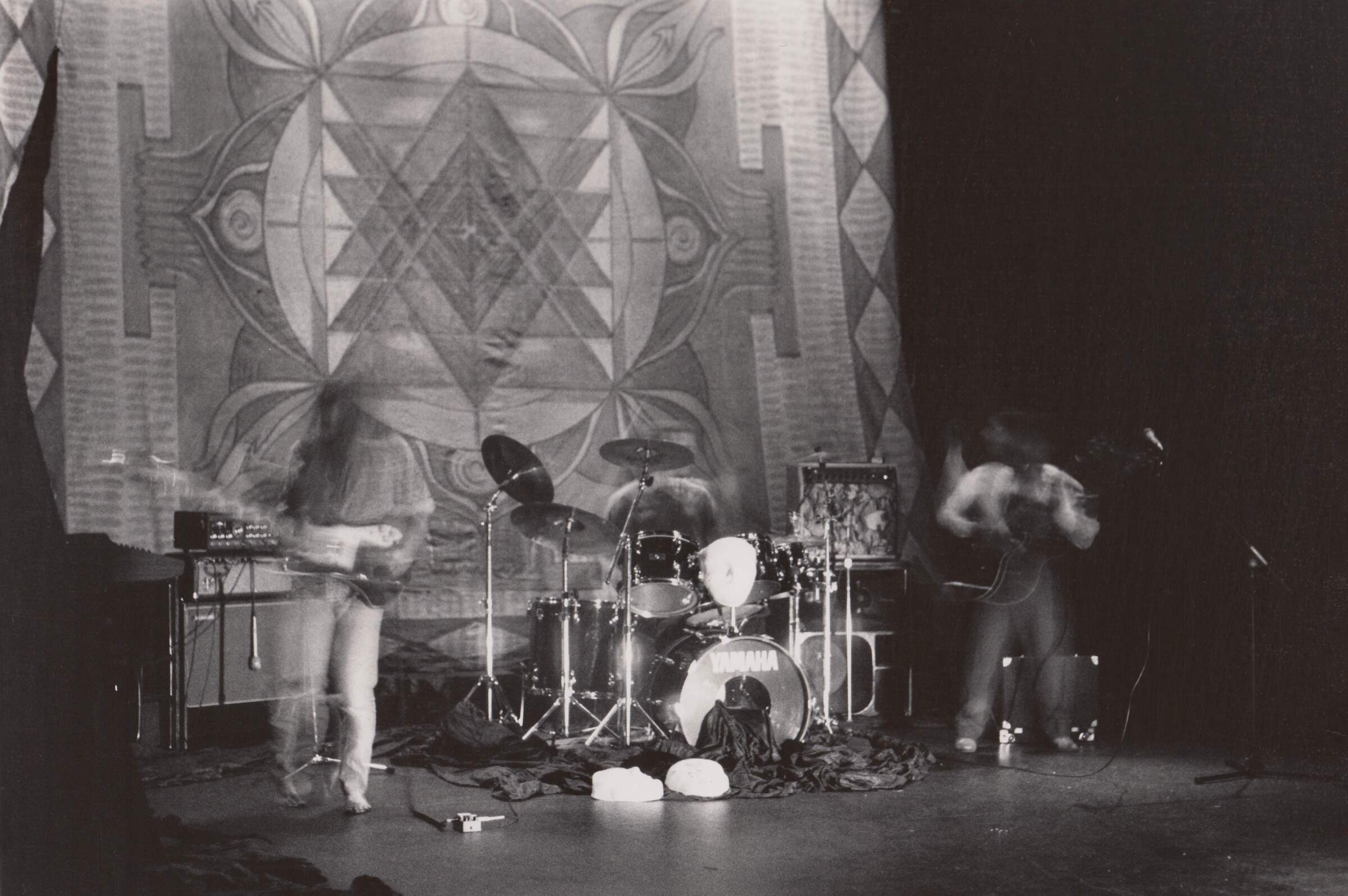
I have Zen Hair !
But thanks fot the solo lp (unknown to me ) and of course the interview.
I have Zen Hair.
But thanks for the unknown solo lp and of course the interview.